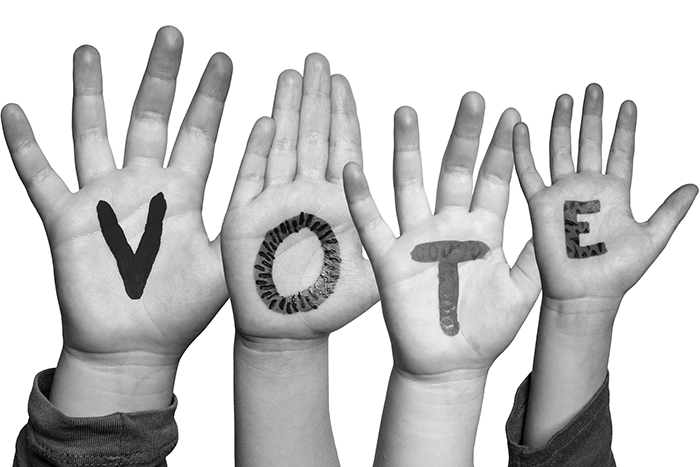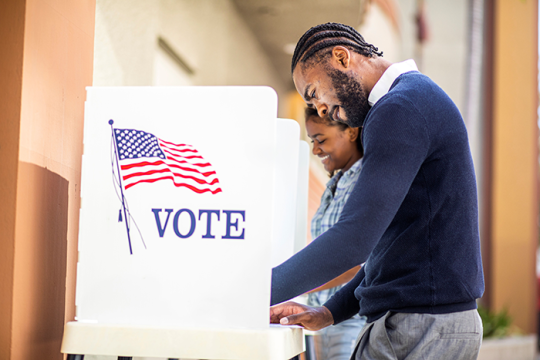
Georgia voters have, for many years, received a sticker on the way out of our polling places - a peach saying "I'm a Georgia Voter."
But in 2020, a tagline was added to the peach: "I SECURED MY VOTE!" That was the year we returned to paper ballots, part of the aftermath of the 2000 election (remember the punch cards and hanging chads?!) The Help America Vote Act of 2002 led to widespread changes in our voting systems, including advances in equipment, cybersecurity, testing and certification, and provisional voting. Georgia in 2020 moved to a system using scanned paper ballots - part of Georgia's "Secure the Vote" initiative - hence the added text on the sticker. To be honest, I had never worried much about the security of my vote. That addition to the sticker seemed to me to play into politics and urban legends…and in a counterintuitive sort of way made me worry more, not less, about behind-the-scenes machinations.
The conversation about voting integrity has only intensified. There have been numerous changes to voting provisions in Georgia over the past several years, including redistricting and changes in polling locations. Georgia's comprehensive Election Integrity Act of 2021 (SB202) established or made changes to existing processes and timelines for both absentee and early voting, rules governing ballot drop boxes, rules for accepting provisional ballots, requirements for counting votes, and rules for poll watchers. The law was widely criticized as discriminatory and suppressing voting, and lawsuits ensued. Thankfully, a few provisions have been blocked for the 2024 election (including one that seemed to receive the most national airtime, banning volunteers from providing food or water to voters waiting in line more than 150 feet from the polls.)
The tumult continues. This year, our (unelected!) State Election Board has drawn a lot of attention. The makeup of the board changed midyear, and they quickly started promulgating new rules very late in the election cycle. Two new rules passed since mid-August were of particular concern:
- Passed August 20 - County officials are to conduct a "reasonable inquiry" before certifying election results. The term "reasonable inquiry" is left open to interpretation. So, what happens if local officials refuse or delay certifying election results? What if an official just doesn't like the result and refuses to certify? It's not a trivial concern - a handful of county election board members in the metropolitan Atlanta area refused to certify local elections in 2023. There are 159 counties in Georgia - 159 opportunities for a certification snag.
- Passed September 20 - requiring hand counting of all ballots. To be clear, this requires each precinct to count the number of paper ballots to ensure that count agrees with the tally from the voting machines; it is not a proposal to count every individual vote for every candidate and ballot initiative. On the surface, one might ask why this is a problem…and advocates for the rule will answer that there have been instances of small numbers of write-in ballots and provisional ballots being found in ballot box compartments, as well as test ballots that should have been removed before formal voting started. Personally, I think the potential for miscounting thousands of ballots by hand in more than 2000 precincts carries a much greater risk of error. It's also unclear how large a discrepancy will be too much. 1 vote? 10? 100? 0.01%? 0.1%? Further, opening the ballot boxes would seem to add opportunity for ballot tampering or loss, increasing risk instead of decreasing it.
It is heartening that after legal challenges, these provisions will be blocked from going into effect for this election cycle. But they could very well be revived for future elections, despite concerns about the rule changes from both major parties as well as the Secretary of State's office.
Don't get me wrong…. of course I think election security and integrity is essential. I'm not an expert in this field, but the public discourse has forced me to pay more attention and learn. I'm all for changes that make sense, which enhance rather than suppress voter access, which demonstrably reduce real risks, and which are fully thought out with time for proper implementation. I just don't think that's what's happening here.
When I cast my vote and get my Georgia voter sticker, I think I'll just trim off the tagline and wear the peach.
Related Posts

Ensuring Voices are Heard and Votes Counted


